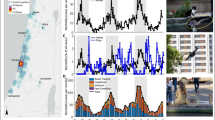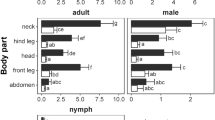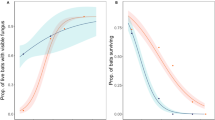Abstract
IT is now generally accepted that Lucilia sericata is the only species of blowfly which causes primary strike of sheep in Britain. Although MacDougall (1909)1 recorded instances of sheep being struck by Calliphora erythrocephala alone, the more recent investigations of Davies (1934)2 in Wales, and of Ratcliffe (1935)3 in Aberdeenshire, failed to reveal any primary species other than Lucilia sericata. The following record is, therefore, of interest.
This is a preview of subscription content, access via your institution
Access options
Subscribe to this journal
Receive 51 print issues and online access
$199.00 per year
only $3.90 per issue
Buy this article
- Purchase on Springer Link
- Instant access to full article PDF
Prices may be subject to local taxes which are calculated during checkout
Similar content being viewed by others
References
MacDougall, R. S., Trans. Highl. Agric. Soc. Scot., 21, 135 (1909).
Davies, W. Maldwyn, Ann. App. Biol., 21, 267 (1934).
Ratcliffe, F. N., Ann. App. Biol., 22, 742 (1935).
Author information
Authors and Affiliations
Rights and permissions
About this article
Cite this article
MACLEOD, J. A New Blowfly attacking Sheep in Western Scotland. Nature 138, 467–468 (1936). https://doi.org/10.1038/138467b0
Issue Date:
DOI: https://doi.org/10.1038/138467b0
This article is cited by
Comments
By submitting a comment you agree to abide by our Terms and Community Guidelines. If you find something abusive or that does not comply with our terms or guidelines please flag it as inappropriate.



